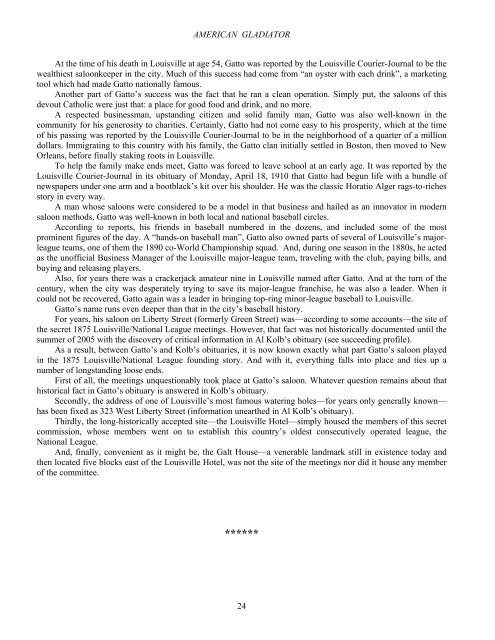AMERICAN GLADIATOR: The Life And Times Of ... - The Book Locker
AMERICAN GLADIATOR: The Life And Times Of ... - The Book Locker
AMERICAN GLADIATOR: The Life And Times Of ... - The Book Locker
Create successful ePaper yourself
Turn your PDF publications into a flip-book with our unique Google optimized e-Paper software.
<strong>AMERICAN</strong> <strong>GLADIATOR</strong><br />
At the time of his death in Louisville at age 54, Gatto was reported by the Louisville Courier-Journal to be the<br />
wealthiest saloonkeeper in the city. Much of this success had come from “an oyster with each drink”, a marketing<br />
tool which had made Gatto nationally famous.<br />
Another part of Gatto’s success was the fact that he ran a clean operation. Simply put, the saloons of this<br />
devout Catholic were just that: a place for good food and drink, and no more.<br />
A respected businessman, upstanding citizen and solid family man, Gatto was also well-known in the<br />
community for his generosity to charities. Certainly, Gatto had not come easy to his prosperity, which at the time<br />
of his passing was reported by the Louisville Courier-Journal to be in the neighborhood of a quarter of a million<br />
dollars. Immigrating to this country with his family, the Gatto clan initially settled in Boston, then moved to New<br />
Orleans, before finally staking roots in Louisville.<br />
To help the family make ends meet, Gatto was forced to leave school at an early age. It was reported by the<br />
Louisville Courier-Journal in its obituary of Monday, April 18, 1910 that Gatto had begun life with a bundle of<br />
newspapers under one arm and a bootblack’s kit over his shoulder. He was the classic Horatio Alger rags-to-riches<br />
story in every way.<br />
A man whose saloons were considered to be a model in that business and hailed as an innovator in modern<br />
saloon methods, Gatto was well-known in both local and national baseball circles.<br />
According to reports, his friends in baseball numbered in the dozens, and included some of the most<br />
prominent figures of the day. A “hands-on baseball man”, Gatto also owned parts of several of Louisville’s majorleague<br />
teams, one of them the 1890 co-World Championship squad. <strong>And</strong>, during one season in the 1880s, he acted<br />
as the unofficial Business Manager of the Louisville major-league team, traveling with the club, paying bills, and<br />
buying and releasing players.<br />
Also, for years there was a crackerjack amateur nine in Louisville named after Gatto. <strong>And</strong> at the turn of the<br />
century, when the city was desperately trying to save its major-league franchise, he was also a leader. When it<br />
could not be recovered, Gatto again was a leader in bringing top-ring minor-league baseball to Louisville.<br />
Gatto’s name runs even deeper than that in the city’s baseball history.<br />
For years, his saloon on Liberty Street (formerly Green Street) was—according to some accounts—the site of<br />
the secret 1875 Louisville/National League meetings. However, that fact was not historically documented until the<br />
summer of 2005 with the discovery of critical information in Al Kolb’s obituary (see succeeding profile).<br />
As a result, between Gatto’s and Kolb’s obituaries, it is now known exactly what part Gatto’s saloon played<br />
in the 1875 Louisville/National League founding story. <strong>And</strong> with it, everything falls into place and ties up a<br />
number of longstanding loose ends.<br />
First of all, the meetings unquestionably took place at Gatto’s saloon. Whatever question remains about that<br />
historical fact in Gatto’s obituary is answered in Kolb’s obituary.<br />
Secondly, the address of one of Louisville’s most famous watering holes—for years only generally known—<br />
has been fixed as 323 West Liberty Street (information unearthed in Al Kolb’s obituary).<br />
Thirdly, the long-historically accepted site—the Louisville Hotel—simply housed the members of this secret<br />
commission, whose members went on to establish this country’s oldest consecutively operated league, the<br />
National League.<br />
<strong>And</strong>, finally, convenient as it might be, the Galt House—a venerable landmark still in existence today and<br />
then located five blocks east of the Louisville Hotel, was not the site of the meetings nor did it house any member<br />
of the committee.<br />
******<br />
24
















